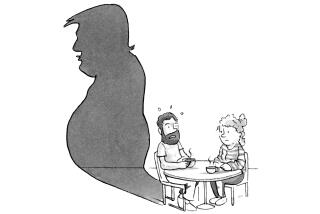Excellent Adventures in Foreign Affairs : HACKS by Christopher S. Wren; Simon & Schuster $23, 287 pages
T.K. is the hapless but lovable foreign correspondent for a newspaper in the Midwest. He is in the imaginary African country of Equatoria, covering one of those endless post-colonial civil wars. The nation’s Marxist government is struggling against U.S.-backed anti-communist guerrillas.
Like all home offices in the tall tales foreign correspondents tell, T.K.’s has a limited notion of what he does and where he is. He desperately needs a new laptop to replace his failing one and sends this message:
“Som*ne* dispa?ch*d ?h* n*w compu?*r to *qua?oria. I’m in *qua?oria ?housands of mil*s away. R*?ry soon*s?.”
For T.K. it’s been a bad week all around.
By eavesdropping on a press photographer’s conversation, he hears the aged, reclusive president of Equatoria admit he’s been negotiating with the rebels. He imagined a front page story at last. But the paper doesn’t run the interview.
T.K. phones his boss to ask why. “The earthquake thing in Turkey,” said the foreign editor, “season’s first no-hitter . . . “ and, besides:
“We ran it by the young readers advisory board,” the foreign editor said. “They missed the local angle.”
“What local angle? Equatoria’s on the other side of the world.”
“I know--the kids couldn’t find it on the map.”
“You let brats decide what makes news now?”
“Publisher’s idea,” the foreign editor said, “to woo the young movers and shakers into the product, T.K. Our demographics are graying.”
As Wren writes in an author’s note, “ . . . Some of the events I write about never happened to foreign correspondents. The rest did.”
An air of wacky authenticity inhabits this novel: The camaraderie and the competition in the small band of foreign correspondents (hacks) who struggle to get a story out of (and perhaps to make sense of) a small ravaged corrupted country. The undrinkable water, the foul food.
And a wonderful cast of human characters begging for the satirist’s pen . . . or laptop. Wren wields that pen with great skill. There is the insufferable government flack--the speaker of Marxist mumbo-jumbo--the Norwegian cameraman whose favorite English word is a mispronounced one beginning with “f,” the Big Foot (a puffed-up world-trotting correspondent who poaches on the work of the hacks who do the work), and the Very Expensive Talent.
The Talent’s my favorite. A big shot on television--”a fluffy blond head of hair atop a safari jacket”--he tours the world with his entourage and electronic equipment that drains the power out of every Third World hotel he stays in and is never quite sure which country he’s broadcasting from.
Wren has a fast-moving and just-barely-plausible plot. And he has a nifty heroine, Cass. She’s an idealistic, impecunious, inexperienced Canadian reporter for public radio. The reader falls for her, and so does T.K., hard.
The obvious point of comparison for this novel is Evelyn Waugh’s 1938 novel, “Scoop.” There are similarities. Both are set in Africa during wartime. Both deftly satirize human folly and the news business. Both make me laugh out loud. Wren is not the stylist Waugh is, but who is? Wren has something Waugh did not show, which is human sympathy.
Wren spares us no details of the misery of the people of a Third World country in a civil war. He shows us rotting corpses and flies, the horribly wounded, the wretched refugees.
But underneath the humor there is passion.
T.K. comes upon the aftermath of a massacre, at least 30 people killed, among them the mother of three children who escaped. He had to write about it. “Whatever he wrote could never undo the horror,” Wren has him think, “but it was better than silence. You couldn’t walk away from something like this.”
Wren dedicates “Hacks” to the memory of two Los Angeles Times foreign correspondents--”tough competitors . . . who never lacked for courage or compassion”: Don A. Schanche, who died in Miami in 1994 and Dial Torgerson, killed on the Nicaraguan-Honduran border in 1983--and New York Times correspondent Nathaniel C. Cash, killed in Croatia in 1996.
More to Read
Sign up for our Book Club newsletter
Get the latest news, events and more from the Los Angeles Times Book Club, and help us get L.A. reading and talking.
You may occasionally receive promotional content from the Los Angeles Times.






